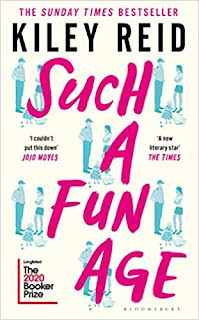Such A Fun Age by Kiley Reid
Such A Fun Age, an exceptionally accomplished debut by US writer Kiley Reid, is about two women. Emira is a black woman who at 25 has a college degree but no real idea what she wants to do with it, so is scraping by as a part-time audio typist and babysitter (she is not, as she frequently points out, a nanny: she's paid cash in hand but has none of the benefits associated with a salaried job). Alix, on the other hand, is an ambitious, wealthy white social media influencer in her early thirties, married to a local news anchor, and hires Emira to look after Briar, her toddler, while she works on a book she's been commissioned to write.
The story begins with Emira getting a late-night phone call at a party. Alix and her husband Peter need someone to take their child out of the house for a few hours in an emergency, and although Emira has had a couple of drinks and is dressed for a night out, she agrees to come and collect Briar and take her to a late-opening supermarket by which Briar is inexplicably fascinated. (Briar's two favourite things, it seems, are tea-bags and nuts.) But the pair attract the attention of white shoppers who are suspicious that a black woman in a mini-skirt is out with a white child in the middle of the night, and Emira finds herself being filmed by another shopper as she tries to explain to a security guard what's going on. "I'll call her father and he can come down here," she says wearily. "He's an old white guy so I'm sure everyone will feel better."
It's because of this incident that Alix becomes determined to get to know Emira and make amends, somehow, for Emira's experience as a young black woman working in a white middle-class neighbourhood. But what are Alix's deeper motives? What is it about Emira that comes to fascinate her so much? And what will she do when she realises that despite all that divides them, there is one big, tremendously awkward, thing they have in common? And what of the shopper - also white - who filmed the supermarket incident on his phone? Kel thinks Emira should make the footage public to highlight systemic racism, but Emira would rather just forget about it and carry on with her life.
This could easily have a been a comic satire about a black woman who is bemused by her white employer's clumsy attempts to be an ally, and it would have been perfectly entertaining if it had, but Such A Fun Age is so much more than that. There are countless nuances to every character and situation and raises so many questions. The power balance between Alix and Emira is not a simple one: Alix holds all the authority and all the privilege but she is deeply insecure - about her weight, about her relationship with Briar, about her past, and about what others think about her (to the point where, after moving from Manhattan to Philadelphia, she attempts to keep up a fiction to her Instagram followers that she's still living in New York). It clearly bothers her that while she is obsessively fascinated by Emira, Emira is politely incurious about Alix.
It's worth noting that there's more than race at play here: Emira is just as patronised by Alix's black friend Tamra as she is by Alix herself and the social and economic gulf between Emira and Alix's circle of friends is painfully awkward. Tamra, like everyone else, thinks Emira lacks direction and needs a career plan, but while Emira is acutely aware of her precarious financial situation, in all other respects she's really quite happy just rolling along. Emira is no pushover - she's clever academically and although she has a natural inclination to avoid attention, she's more than capable of standing her ground when she needs to. Why should she have to prove herself?
Such A Fun Age is a thoughtful with complex characters about whose motives you'll change your mind repeatedly as the story unfolds, and yet it's also compulsively readable and very funny. It was longlisted for the Booker prize and I think it was a poor decision on the part of the judges not to put it forward to the shortlist stage. I'm sure if Kiley Reid's prose was more showy (and less funny) they might have done, and yet the casual ease of Reid's style is every bit as difficult to achieve - and an unmitigated pleasure to read.

Comments
Post a Comment